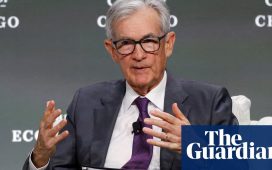One of life’s unfairnesses, officials at the London Stock Exchange sometimes grumble, is that high-profile flotation flops in the UK tend to be remembered for years whereas IPO disasters in New York are quietly forgotten as the locals move on and look for the next big thing. The complaint has some merit. Take Cazoo, whose car crash for investors would surely have generated many more headlines if it had happened in London.
The UK-based used-car website opted for a New York listing in 2021 because high-growth companies “are better understood by US investors”, as its founder, Alex Chesterman, put it at the time. Ho, ho. It turns out that the American assessment that Cazoo was worth $8bn (£6.4bn) could not have been more wrong.
With the shares down 99.9% since debut, Cazoo quietly told its shareholders this week that the end of road may be nigh. It has filed a notice of intention to appoint administrators in the high court in London in respect of some of its “material subsidiaries”.
Cazoo’s implosion is a shame, of course – not least for its employees (vastly reduced in number these days). The reputation for excellent customer service was deserved and the company proved one point in showing that punters are willing to buy cars online; it has sold 160,000 vehicles since launch in 2019.
But the business model generated astonishing losses of £700m in 2022, and a retreat from continental Europe two years ago came as one of many “realignments”. In March, Cazoo said it would dispose of all its stock and adopt an “online marketplace” model serving the car dealers it was established to challenge.
Higher interest rates and a UK recession haven’t helped, but the primary winners from this experiment in building a brand, while worrying about profits later, have been all those football clubs (Aston Villa, Everton and more) and sporting events (horse racing, darts, snooker, cricket) who benefited from Cazoo’s marketing budget. The company was god’s gift to the sports sponsorship industry.
A stock market lesson here is that we should be more sceptical of the caricature that UK fund managers are a bunch of dinosaurs, who don’t “get” cash-burning tech companies. Sometimes investors are simply making rational judgments. If they wouldn’t award Cazoo a £6bn-plus valuation in London in 2021, that is surely to their credit.
One that did get away in London in the 2021 vintage was Deliveroo, which was also absurdly overpriced (shares down two-thirds from the initial £7.6bn valuation) but it has not been a “floperoo” like Cazoo has. Deliveroo is still standing, is talking about the prospect of profits and has been buying back shares.
The other lesson is for UK companies contemplating a Cazoo-style path to the US markets: the UK record over there ain’t great. Yes, there are successes – the Oxford-based biotech Immunocore Holdings and Arm Holdings – but the overall statistics are poor. The London Stock Exchange has inspected the public numbers (as it would) and found that, of the 20 UK companies that have raised over $100m in the US over the last decade, eight have already delisted, only three are trading above their IPO price, and the rest are trading down by an average of 71%.
after newsletter promotion
Those numbers don’t even include the UK exports, such as Cazoo and the failed electric van firm Arrival, that adopted the briefly fashionable method of going public in the US via a special purpose acquisition company, or Spac; performance in that category has been worse. None of which alters the correct view, that the London stock market desperately needs an injection of new companies. But at least it avoided the Spac silliness.









